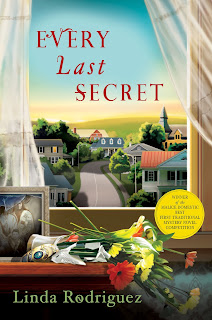Making a List and Checking It Twice
help technology and professional writing books and programs can give me in
writing. I’ve tried using all kinds of workbooks, charts, and forms in working
on a novel. I’m even now learning to use Scrivener to write my next book. I’m
hardly on the cutting edge, but I’m also not one of the “if it was good enough
for Hemingway, it’s good enough for me” types. Still, sometimes we look around
and find simple everyday solutions to our problems, and it would be silly not
to take advantage of them.
found in writing a novel is the simple, old-fashioned list. If you’re like me,
you use lists to remind you what you need to do during the day, what you need
to pack for a trip, what you need to buy at the grocery store, and dozens of
other mundane projects, large and small. It’s easy to assume we need something
more sophisticated for this complex novel (for novels are all more or less
complex) that we’re trying to hold in our heads and build on paper. However,
I’ve discovered that simple lists can help in several ways with making that
story in our head a reality in print.
and place lists. I write a mystery series. When I wrote the first book, Every Last Secret, I was creating all
the characters from scratch, as well as all the places in my fictional town.
I wrote personality and appearance sketches for each character, but in
addition, I made a list of each character as s/he appeared with a few words to
note key characteristics. I did the same for places in my made-up town. This
meant I could look up the full name of walk-on characters easily when I needed
to much later in the book. It meant that I could easily look up the important
details of the buildings on the campus and the shops on the town square as my
protagonist, Skeet Bannion, walked past them or into them.
started the second book in the series and then the third and fourth. No one will have brown
eyes in the first novel and baby-blues in one of the later books, unless I
forget to check my list. Old Central, the 19th century castle-like
mansion on the Chouteau University campus, will not morph into a 1960s Bauhaus
box of a building.
lists come to my aid again. I’m a combination of outliner and
follow-the-writing plotter. I like to know where the next 25-50 pages are
going, plotwise—or to think I do, at least. I do this by making a list of
questions that I need to answer about the book. In the beginning, I have lots
of questions. The answer to only one or two may give me enough to start the
next several days’ writing. I stole the idea of asking myself questions and
answering them in writing from Sue Grafton. She posts to her website journals
that she keeps while writing each novel, and in these, she often asks and
answers these types of questions. I took it a bit further by trying to make
long lists of questions that needed to be answered, which often, in turn, add
more questions to the list when they are answered.
the story wants to go, but these lists also help me keep the subplots straight
and make sure they tie in directly to the main plot, and they keep me from
overlooking some detail or element that will create a plot hole or other
disruption for the reader. These questions can vary from broad ones, such as
“What is the book’s theme?” and “How can I ratchet up the excitement and stakes
in Act II?” to more detailed, such as “What clue does Skeet get from this interview?”
and “What’s on Andrew’s desk?” Such question lists come in handy during
revision, as well.
kind of simple list. As I’m reading the manuscript straight through in hard
copy, I write down a list of questions as I go. I notice a weak spot and ask
myself, “How can I let the reader know how much Jake meant to Skeet, as well as
Karen?,” “Should I have Skeet attend Tina’s autopsy?,” and all too often,
“Reads competent enough, but where’s the magic?”
hundreds of big to tiny fixes and changes to make, and listing by scene where
in the book to make the fix (for major issues), I sit down to wrestle with 5-15
major structural problems from almost but not quite minor to huge and complex.
This final list is my guideline through the swamps of revision. The issues on
this list require changes that thread throughout part or all of the book.
Trying to do them all at once or even to keep them in my mind all at the same
time would bog me down—perhaps forever. Listing them and working my way one
item at a time through that list helps me to keep my focus even while dealing
with very complex situations that must be woven in and out through the length
of the novel.
complex task of writing a novel doable for me. What about you? Do you use lists
in your writing? Are there other tools you use for keeping track and keeping
focused as you plot, write, and revise?
Press featuring Cherokee campus police chief, Skeet Bannion—Every Hidden Fear, Every Broken Trust, and Every
Last Secret—have received critical recognition and awards, such as Latina
Book Club Best Book of 2014, the Malice Domestic Best First Traditional Mystery
Novel Award, selections of Las Comadres National Latino Book Club, 2nd
Place in the International Latino Book Awards, finalist for the Premio Aztlán
Award, 2014 ArtsKC Fund Inspiration Award, and Barnes & Noble mystery pick.
Her short story, “The Good Neighbor,” published in the anthology, Kansas City Noir, has been optioned for
film.
Hunger (Scapegoat Press) and Heart’s
Migration (Tia Chucha Press), Rodriguez received numerous awards and
fellowships. Rodriguez is 2015 chair of the AWP Indigenous/Aboriginal American
Writer’s Caucus, past president of the Border Crimes chapter of Sisters in
Crime, a founding board member of Latino Writers Collective and The Writers
Place, and a member of International Thriller Writers, Wordcraft Circle of
Native American Writers and Storytellers, and Kansas City Cherokee Community. Find
her at http://lindarodriguezwrites.blogspot.com.




